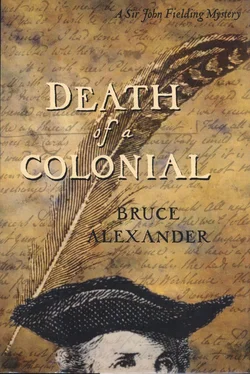Bruce Alexander - Death of a Colonial
Здесь есть возможность читать онлайн «Bruce Alexander - Death of a Colonial» весь текст электронной книги совершенно бесплатно (целиком полную версию без сокращений). В некоторых случаях можно слушать аудио, скачать через торрент в формате fb2 и присутствует краткое содержание. Год выпуска: 1999, ISBN: 1999, Издательство: Putnam Adult, Жанр: Исторический детектив, на английском языке. Описание произведения, (предисловие) а так же отзывы посетителей доступны на портале библиотеки ЛибКат.
- Название:Death of a Colonial
- Автор:
- Издательство:Putnam Adult
- Жанр:
- Год:1999
- ISBN:9780425177020
- Рейтинг книги:3 / 5. Голосов: 1
-
Избранное:Добавить в избранное
- Отзывы:
-
Ваша оценка:
- 60
- 1
- 2
- 3
- 4
- 5
Death of a Colonial: краткое содержание, описание и аннотация
Предлагаем к чтению аннотацию, описание, краткое содержание или предисловие (зависит от того, что написал сам автор книги «Death of a Colonial»). Если вы не нашли необходимую информацию о книге — напишите в комментариях, мы постараемся отыскать её.
Death of a Colonial — читать онлайн бесплатно полную книгу (весь текст) целиком
Ниже представлен текст книги, разбитый по страницам. Система сохранения места последней прочитанной страницы, позволяет с удобством читать онлайн бесплатно книгу «Death of a Colonial», без необходимости каждый раз заново искать на чём Вы остановились. Поставьте закладку, и сможете в любой момент перейти на страницу, на которой закончили чтение.
Интервал:
Закладка:
“Certainly, a more reasonable theory than that put forward by the coroner. But what do you make of the broken lenses of the spectacles?”
“Why, that only supports what I have said, for she likely lost her spectacles in a struggle. That the lenses were broken suggests that they were trod upon. That they were found in a far corner near the window says that they were likely kicked there.”
“Very good indeed. You’ve done so well that I must now impose another task upon you. “
“Anything at all, sir. Just tell me what you wish.”
He rubbed his chin in thought for a moment, then said he: “Perhaps I had best leave that to you. I may as well confess to you that I intend to ignore their caution that we take nothing with us. We shall take whatever aids our investigation. So let that be your measure. If you see anything — old letters, pertinent papers of any sort — then by all means take it and tuck it away. We shall make our evaluation later.”
I roamed the apartment through. A sitting room, a small bedroom, and a tiny kitchen were all that required my attention, and there were not a great many places within these three rooms where matter of the kind described by Sir John might be stored — or hidden. I began my search in the bedroom. At the foot of her old canopy bed there was a chest; digging into it hopefully, I found it contained no more than bedclothes. Though there were drawers at the bottom of the wardrobe in the corner, they yielded no more than undergarments and stockings. The kitchen shelves contained only what one might expect to find on kitchen shelves. Then finally into the sitting room, where Sir John awaited me, and where I saw only a bureau of modest size as a likely repository for that which I sought. There were drawers and compartments aplenty in it, and each one seemed to be overburdened with papers of one kind or another. I went through them as quickly as I could, retained a few old letters from her son Lawrence, and disposed of the rest by stuffing them higgledy-piggledy into the places whence they had come.
I looked about and sighed, thinking that I had spent a good deal of time and had little to show for it. Then did my eye come to rest upon a bookcase which was well filled and seemed to invite examination. Well I knew from discoveries made among the books left in my attic room that papers of all kinds (some of them of interest, though most quite valueless) are often tucked between the pages only to fall out quite unexpectedly. I saw that a thorough search would mean a search of the Widow Paltrow’s books, as well. I fell upon them without much sense of purpose but with the feeling that when at last I had done with them, the onus would be lifted. I had grown weary of the search. I gave each book a shake. Every now and again I was rewarded when a bit of paper would come fluttering out of the book in hand and onto the floor. What I had harvested in this way could not be said to amount to a pile but, rather, at best to a slender sheaf. But in this way, quite unexpectedly, I came across Lawrence Paltrow’s diary.
I call it that, though he did not. It was a sort of notebook cum sketchbook bound in rough durable leather; across its cover was lettered in bold style, “Journal of Exploration and Discovery” and the name, Lawrence Paltrow. It was on the bottom shelf that I found it, secluded behind three larger books. It was evident the Widow Paltrow had attempted to hide it — but why? and from whom? I glanced through it and found myself fascinated by the drawings of birds, leaves, and flowers on nearly every page; the text was, for the most part, descriptive of various phenomena of nature, though there were personal notes, as well. Gratified that I had come across what seemed a substantial finding, I tucked it away into one of the capacious pockets of my bottle-green coat. With that, I counted my search complete.
“I am ready, Sir John,” said I.
“Have you found anything of interest?”
“A few things, perhaps — one of almost certain significance.”
“Let us, then, be gone from here.”
Outside her door, a downward glance told me that Mrs. Paltrow’s body had been removed. To what place I knew not, yet it seemed to me that anywhere would be better than that patch of floor she had occupied at the bottom of the stairway.
As we two descended in tandem, Sir John remarked to me that he wished to revisit Mrs. Eakins.
The name was familiar, but. . “And who is she, sir?”
From him came a deep sigh of disappointment. “The shortness of your memory does sometimes astound me, Jeremy. You should attempt exercises to increase and lengthen it. However” — again that dreadful sigh — “to answer your question, Mrs. Eakins is the woman who dwells on the ground floor. It was she who directed us to the Widow Paltrow yesterday afternoon.”
“Ah, so she was!”
“Indeed, she was.”
No word more was spoken until we stood before her door, at which time he said in a manner rather severe: “I have noted that you have taken to knocking in a timorous, tentative style. A good knock should be done with strength and authority. Let me demonstrate.”
And so saying, he measured the distance to the door, then gave four or five solid thwacks to it with his doubled fist.
Indeed, I was impressed, and so, reader, was Mrs. Eakins. We heard footsteps, and then through the door, her voice: “Who is it pounding on my door so rude? There’s constables about. I’ll stick my head out the window and holler one here, I shall. Now, away with you! “
“Madam, I assure you I meant no harm with my knock upon your door. I have but a few questions for you regarding the death of the Widow Paltrow.”
She made no move to open the door. “And who are you?”
“Sir John Fielding, Magistrate of the Bow Street Court in London. You gave me directions to your tenant yesterday afternoon.”
Then at last we were relieved to hear a bolt slip and a key turn. Slowly — and one might even say suspiciously — the door came open, and the gray-haired woman peered out at us.
“Now I remembers you, “ said she, “the blind man. Why didn’t you say so.”
Her question seemed to confound Sir John quite properly. He sputtered, then made what I thought was an odd declaration. “Because. . because, madam, I do not particularly think of myself as a blind man. I am simply who I am.”
“Hmmm,” said she, unwilling, at least for the moment, to examine the implications of what he had just said. “Well, what do you wish to know? “
“I fear that what I have to ask you were asked earlier by Mr. Bester or Dr. Diggs.”
“Who are they? “
“Why, they are, respectively, the Magistrate and Coroner of Bath. “
“That’s as may be, but none came to ask me a question, save a constable name of Merryman I knew from before.”
“And what did he ask you?”
“He asked who lived up above besides old Mrs. Paltrow. I told him what I’d tell you, that as of this week none lived there but her. We had some flooding, chased everyone out but her. I don’t know why those two had to leave. ’Twas me got the worst of it. All they had to do was get their feet wet before they climbed up the stairs. I had to -
“I regret that, madam. I do, truly. But that is not the question I wished to ask you. I wish to know when it was you heard poor Mrs. Paltrow fall down. Could you give an estimate as to the time of the day or evening?”
She looked at Sir John oddly. “I never did hear her.”
“You mean you heard no fall, no tumble, no cry for help?”
“Course I never heard her. You think I wouldn’t have run out to help? Peg and I, we go back a ways. She wasn’t just a tenant. She was my friend.”
“Then I am sorry for your loss,” said Sir John. “But surely you must have slept through it all. Such a fall would have caused a great deal of noise.”
Читать дальшеИнтервал:
Закладка:
Похожие книги на «Death of a Colonial»
Представляем Вашему вниманию похожие книги на «Death of a Colonial» списком для выбора. Мы отобрали схожую по названию и смыслу литературу в надежде предоставить читателям больше вариантов отыскать новые, интересные, ещё непрочитанные произведения.
Обсуждение, отзывы о книге «Death of a Colonial» и просто собственные мнения читателей. Оставьте ваши комментарии, напишите, что Вы думаете о произведении, его смысле или главных героях. Укажите что конкретно понравилось, а что нет, и почему Вы так считаете.












